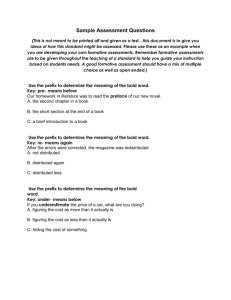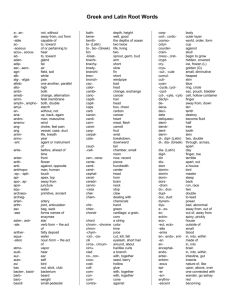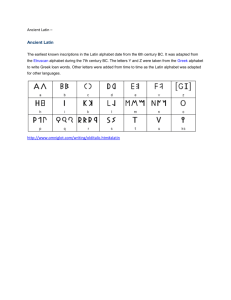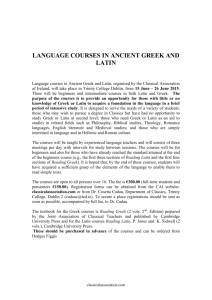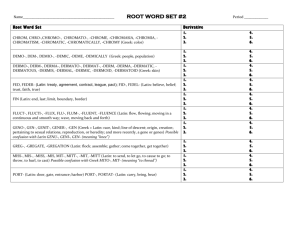A Glossary of Basic Greek and Latin Elements Borrowed
advertisement
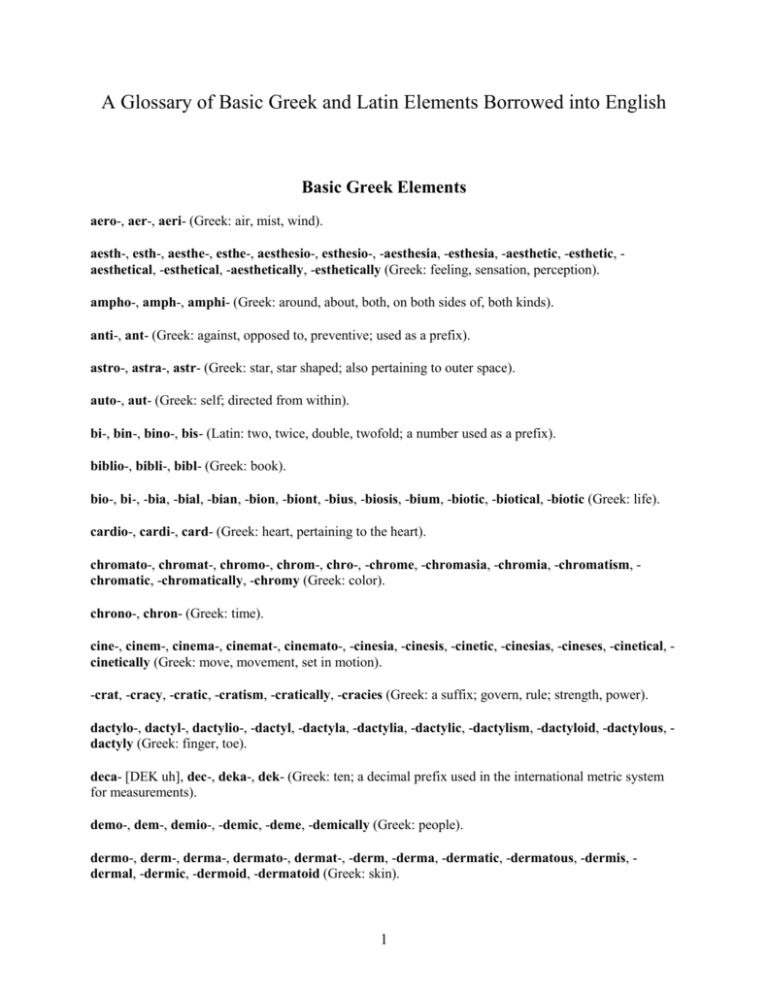
A Glossary of Basic Greek and Latin Elements Borrowed into English Basic Greek Elements aero-, aer-, aeri- (Greek: air, mist, wind). aesth-, esth-, aesthe-, esthe-, aesthesio-, esthesio-, -aesthesia, -esthesia, -aesthetic, -esthetic, aesthetical, -esthetical, -aesthetically, -esthetically (Greek: feeling, sensation, perception). ampho-, amph-, amphi- (Greek: around, about, both, on both sides of, both kinds). anti-, ant- (Greek: against, opposed to, preventive; used as a prefix). astro-, astra-, astr- (Greek: star, star shaped; also pertaining to outer space). auto-, aut- (Greek: self; directed from within). bi-, bin-, bino-, bis- (Latin: two, twice, double, twofold; a number used as a prefix). biblio-, bibli-, bibl- (Greek: book). bio-, bi-, -bia, -bial, -bian, -bion, -biont, -bius, -biosis, -bium, -biotic, -biotical, -biotic (Greek: life). cardio-, cardi-, card- (Greek: heart, pertaining to the heart). chromato-, chromat-, chromo-, chrom-, chro-, -chrome, -chromasia, -chromia, -chromatism, chromatic, -chromatically, -chromy (Greek: color). chrono-, chron- (Greek: time). cine-, cinem-, cinema-, cinemat-, cinemato-, -cinesia, -cinesis, -cinetic, -cinesias, -cineses, -cinetical, cinetically (Greek: move, movement, set in motion). -crat, -cracy, -cratic, -cratism, -cratically, -cracies (Greek: a suffix; govern, rule; strength, power). dactylo-, dactyl-, dactylio-, -dactyl, -dactyla, -dactylia, -dactylic, -dactylism, -dactyloid, -dactylous, dactyly (Greek: finger, toe). deca- [DEK uh], dec-, deka-, dek- (Greek: ten; a decimal prefix used in the international metric system for measurements). demo-, dem-, demio-, -demic, -deme, -demically (Greek: people). dermo-, derm-, derma-, dermato-, dermat-, -derm, -derma, -dermatic, -dermatous, -dermis, dermal, -dermic, -dermoid, -dermatoid (Greek: skin). 1 dyna-, dyn-, dynamo-, -dyne, -dynamia, -dynamic (Greek: power, strength, force, mightiness). dys- (Greek: bad, harsh, wrong; ill; hard to, difficult at; slow of; disordered; used as a prefix). eco-, oeco-, oec-, oiko-, oik- (Greek: house, household affairs [environment, habitat], home, dwelling; used in one extensive sense as, “environment”). endo-, end- [before vowels or “h”] (Greek: within, inside, into, in, on, inner; used as a prefix). epi-, ep- [before vowels or “h”] (Greek: above, over, on, upon; besides; in addition to; toward; among; used as a prefix). ergo-, erg- (Greek: work). Also: urg-, [erg-], -urgy, -urgia, -urgical, -urgically, -urgist, -urge (Greek: work). etym- (Greek: truth, true meaning, real [the root meaning, true meaning or literal meaning of a word]). eu- (Greek: good, well, normal; happy, pleasing; used as a prefix). ex- (e-, ef-). (Latin: [out of, from]; [upward]; [completely, entirely]; [to remove from, deprive of]; [without]; [former]; used as a prefix). Also: ex-, ec-, e- (Greek: out of, out, outside; away from; used as a prefix). geo-, ge- (Greek: earth, world). glotto-, glot-, -glott (Greek: tongue; by extension, “speech, language”). Also: glosso-, gloss- (Greek: tongue; language, speech). grapho-, graph-, -graph, -graphy, -grapher, -graphia (Greek: to scratch; write, record, draw, describe). gymno-, gymn- (Greek: naked, uncovered; unclad). gyno-, gyn-, gynaeco-, gyneco-, gyne-, -gynia, -gynic, gynec-, -gynist, -gynous, -gyny (Greek: woman, female). helio-, heli- (Greek: sun). hemi- (Greek: half). hetero-, heter- (Greek: different, other, another, unlike; used as a prefix). hippo-, hipp- (Greek: horse). homo-, hom- (Greek: same, equal, like, similar, common; one and the same). hydro-, hydra-, hydr-, hyd- (Greek: water). hyper-, hyp- (Greek: above, over; excessive; more than normal; abnormal excess [in medicine]; abnormally great or powerful sensation [in physical or pathological terms]; highest [in chemical compounds]; used as a prefix). 2 hypo-, hyp- (Greek: under, below, beneath; less than; too little; deficient, diminished; used as a prefix). icono-, icon- (Greek: image, likeness; sacred or holy image). -itis (Greek: a suffix; inflammation, burning sensation; by extension, disease associated with inflammation). kilo- [KIL oh or KEEL oh], kil- (Greek: one thousand; a decimal prefix used in the international metric system for measurements). kine-, kin-, kino-, kinesio-, kinesi-, kineto-, kinet-, -kinesia, -kinesis, -kinetic, -kinesias, -kineses, kinetical, -kinetically (Greek: move, set in motion; muscular activity). Also: cine-, cinem-, cinema-, cinemat-, cinemato-, -cinesia, -cinesis, -cinetic, -cinesias, -cineses, -cinetical, -cinetically (Greek: move, movement, set in motion). -latry, -olatry, -later, -olater, -latress, -olatress, -latria, -latrous, -olatrous (Greek: a suffix; worship; excessively, fanatically devoted to someone or something; “service paid to the gods”). litho-, lith-, -lith, -lithic, -lite, -liths, -lites (Greek: stone, rock). logo-, log-, -logia, -logical, -logism, -logician, -logian, -logist, -logy, -logue (Greek: talk, speech, speak; word). macro-, macr- (Greek: large, great; long [in extent or duration]; enlarged, or elongated, long). -mania, -maniac, -maniacal, -manic, -manically, -maniacally (Greek: mental disorder). mega- [MEG uh], meg- (Greek: large, great, big, powerful; a decimal prefix used in the international metric system for measurements). meter-, metro-, metr-, -metrical, -metrically, -metron, -metric, -metrist, -meters, -metry, -metre (Greek: measure). micro-, micr- (Greek: small, tiny; a decimal prefix used in the international metric system for measurements). miso-, mis- (Greek: hate, hater, hatred; used as a prefix). mne-, mnem-, mnemon-, mnes-, -mnesia, -mnesiac, -mnesic, -mnestic (Greek: memory, to remember). mono-, mon- (Greek: one, alone, single; a number used as a prefix). morpho-, morph-, -morphous, -morphically, -morphia, -morphosis, -morphously, -morphy, morphic, -morphism (Greek: shape, form, figure, appearance). naus-, nau- (Greek: ship, sailor). neo-, ne- (Greek: new, recent, current, young). odonto-, odont-, odon-, -odont, -odonic, -odontic, -odontia, -odontoid (Greek: tooth, teeth). 3 -oid, -oidal, -oidism, -ode (Greek: a suffix; like, resembling, similar to, form). oligo-, olig- (Greek: few, small; abnormally few or small; used as a prefix). onomato-, onoma-, onomo-, onom-, ono- (Greek: name; word). ortho-, orth- (Greek: right, straight, correct, true; designed to correct). pachy-, pacho-, pach- (Greek: thick, dense; large, massive). pedo-, paedo-, ped-, paed-, paido-, paid- (Greek: child). The British tend to use “paed-” while those in the United States tend to use “ped-”. Remember that the Greek ped- means “child” while the Latin ped- means “foot”. Don't confuse this Greek element with another Greek pedo- that means “ground, soil, earth”. pan-, panto-, pant- (Greek: all, every). patho-, -path-, -pathia, -pathic, -pathology, -pathetic, -pathize, -pathy (Greek: feeling, sensation, perception, suffering, [in medicine, it usually means “one who suffers from a disease of, or one who treats a disease”]). peri- (Greek: around, about, near, enclosing; used as a prefix). petro-, petr-, peter- (Greek: stone, rock). phago-, phag-, -phag, -phage, -phagic, -phagia, -phagism, -phagist, -phagous (Greek: eat, consume). philo-, phil-, -phile, -philia, -philic, -philous, -phily, -philiac, -philist, -philism (Greek: love, loving, friendly to, fondness for, attraction to, strong tendency toward, affinity for). Note: under some circumstances, -philia means “unwholesome-sexual attraction” to something or someone, as in pedophilia (paedophilia). -phobia, -phobias, -phobe, -phobiac, -phobist, -phobic, -phobism, -phobous; phobo-, phob- (Greek: fear, extreme fear of, morbid fear of, excessive fear of, irrational fear or terror of something or someone; however, sometimes this Greek element means a strong dislike or hatred for something). Noun endings are formed with -phobia and -phobe; while adjectives end with -phobic. phono-, phon-, -phone, -phonia, -phonic, -phonetic, -phonous, -phonically, -phonetically, -phony (Greek: phone; sound; voice). photo-, phot-, -photic, -phote (Greek: light). pneumo-, pneum-, pneumono-, pneumon- (Greek: lung [breath]). podo-, pod-, -poda, -pod, -pode, -podium, -podia, -podial, -podous, -pody (Greek: foot, feet). polis-, polit-, poli- (Greek: city; method of government). 4 poly- (Greek: many, much; too many, too much, excessive; often used as a prefix). Don’t confuse this poly- with the next -poly that means “to sell”. -poly, -pole, -polism, -polist, -polistic, -polistically (Greek: used as a suffix; sale, selling; one who sells; pertaining to selling). Don’t confuse this element with the previous poly- that means “many”. pro-, por- (Greek > Latin: used as a prefix). 1 before forward 3 for, in favor of 4 in front of 5 in place of, on behalf of 2 pseudo-, pseud- (Greek: false, deception, lying, untrue, counterfeit; used as a prefix). psycho-, psych-, -psyche, -psychic, -psychical, -psychically (Greek: the mind or the mental processes). Etymologically, this element includes such meanings as, breath, life, soul, spirit, mind, and consciousness. pyro-, pyr- (Greek: fire, burn; and sometimes “fever”; heat, produced by heating). sarco-, sarc-, -sarcous, -sarc, -sarcoma, -sarcomatous, -sarcomatoid (Greek: flesh, meat). sauro-, saur-, -saurus, -saurid, -saur, -sauria, -saurian (Greek: lizard). scopo-, scop-, scept-, skept-, -scope-, -scopy, -scopia, -scopic, -scopist (Greek: see, view, sight, look at, examine). seismo-, seism-, -seism, -seisms, -seisma, -seismically, -seismical, -seismal, -seismic (Greek: shake, earthquake [move to and fro’; to shake, move violently]). soma-, som-, somat-, somato-, -soma, -some, -somus, -somia, -somic, -somal, -somite, -somatous, somatia, -somatic (Greek: body; mass). sopho-, soph-, sophic, -soph, -sopher, -sophy, -sophical, -sophically, -sophist (Greek: wise, wisdom; knowledge). stereo-, stere- (Greek: solid, firm, hard; three-dimensional). syn-(sy-, sym-, syl-, sys-). (Greek: together, with, along with). By extension, syn- may also mean: together, with; united; same, similar; at the same time. tacho-, tach-, tachy- (Greek: fast, speed, swift, rapid). 5 techno-, techn-, tect-, -technic[s], -technique, -technology, -technical, -technically (Greek: art, skill, craft; techne, art, skill, craft; tekton, “builder”). tele-, tel-, telo-, -telic, -telical (Greek: far away, far off, at a distance). Don’t confuse this tele- with the teleo- that means “end, last”. thanato-, thanat-, thanas-, -thanasia, -thanasic (Greek: death, dead). theo-, the-, -theism, -theist, -theistic (Greek: God, god, deity, divine). therap-, -therapeutic[s], -therapeutically, -therapy, -therapies, -therapist (Greek: heal, cure; treatment; service done to the sick, a waiting on). thermo-, therm-, thermi-, -thermia, -therm, -thermal, -thermic, -thermous, -thermy (Greek: heat). toxico-, toxic-, toxi-, tox-, toxin-, -toxically, -toxaemia, -toxemia, -toxaemic, -toxemic, -toxical, -toxy, -toxis, -toxicosis, -toxism, -toxia, -toxin, -toxicity (Greek: poison). xeno-, xen- (Greek: foreign, foreigner, strange, stranger; and by extension, guest). The “x” in xeno- is pronounced “z”; “zeno”. Greeks are said to have considered any stranger a “guest” and modern Greek includes xenodocheion a “guest house” or “house for guests” or its modern version of “hotel”. xero-, xer-, xir- (Greek: dry). zoo-, zo-, -zoic, -zoid, -zoite, -zoal, -zonal, -zooid, -zoon, -zoa, -zoan (Greek: animal; living being; life). Basic Latin Elements a-, ab-, abs- (Latin: from, away, away from; used as a prefix). This prefix is normally used with elements of Latin and French origins (abs- usually joins elements beginning with c, q or t). The form ab- is regularly used before all vowels and h; and it becomes a- before the consonants m, p, and v. The prefix apo- has similar meanings. ad- (Latin: to, a direction toward, addition to, near; used as a prefix). ad- appears before vowels and before the consonants d, h, j, m, and v: agri-, agrio- (Greek > Latin: fields). “Wild, savage; living in the fields” through Latin, ager, agri. amat-, amor-, am- (Latin: love, loving; fondness for). 6 ami-, amic- (Latin: friend). ambi-, amb- (Latin: both, on both sides; around, about). ambul-, ambulat-, -ambulate, -ambulating, -ambulation -ambulator, -ambulatory, -ambulant, ambulic, -ambulism, -ambulist (Latin: walk, take steps, move around; from “to wander, to go astray”). anima-, anim- (Latin: animal life; breath; soul; mind). Anima- is “a living being” from a Latin form meaning, “of air, having a spirit, living”, which in turn comes from another form meaning, “breath of air, air, soul, life”. anni-, annu-, enni- (Latin: year, yearly). ante-, anti-, ant- (Latin: before, in front of, prior to, forward; used as a prefix). Compare this element with anti-, meaning “against”. Anti-, with the meaning of “before”, is found in very few words, such as: “antipasto” (from Italian). and “anticipate” with its various forms, plus a few scientific terms. aqua-, aquatic-, aqui-, aqu-, -aquatically, aque-, -aqueous (Latin: water). audio-, aud-, audi-, audit- (Latin: hearing, listening, perception of sounds). bene-, ben-, beni- (Latin: good, well) and bon- (Latin: good). brevi-, brev- [brie-, bri-] (Latin: short). cand-, can-, cend- (Latin: glow; white). capit-, capt-, ceps-, chapt-, chef, cip-, -cup- (Latin: head, leader, chief, or first). carno-, carn-, carne-, carni- (Latin: flesh, meat). celer- (Latin: fast, speed, swift, rapid). centi-, cent- (Latin: hundred; a decimal prefix used in the international metric system for measurements). This prefix is used in the metric [decimal] system as, one-hundredth [U.S.] and hundredth [U.K.], and denotes 1/100th of a unit or 10-2 [0.01]. The metric symbol for centi- is c. -cise, -cis, -cide (Latin: a suffix; to cut, cut). -cide, -cides, -cidal (Latin: a suffix; kill, killer; murder, to cause death, slayer; cutter; “to cut down”). Don’t confuse this element with the another -cide that means “to cut”; although -cide, “death”, is related to -cise, -cide, “to cut down”. circum- (Latin: around, about, surrounding, on all sides; literally, “in a circle”). 7 com- [co-, cog-, col-, con-, cor-] (Latin: together, with; used as a prefix). contra-, contro-, counter, contre- (Latin: against, opposed to, opposite, contrary; used as a prefix). cor-, cord-, cour- (Latin: heart). corp-, corpor-, corpus- (Latin: body). cred-, credit-, creed- (Latin: believe, belief, faith, confidence, trust). cura-, cur- (Latin: heal, cure [care for, give attention to, to take care of]). cur(r).-, curs-, -course (Latin: run, go). dei-, div- (Latin: God, god [deity, divine nature]). adieu (French): Goodbye (literally, “I commend you to god.”). dento-, dent-, denta-, dentino-, denti-, dentin- (Latin: tooth, teeth). dic-, dict- (Latin: talk, speak, say, tell, declare). digit (Latin: finger, toe). dor-, do-, don- (Greek > Latin: gift). dorm-, dormi- (Latin: sleep, sleeping). duo-, du- (Latin: two; a number used as a prefix). duc-, -duce, -duct, -ducent, -ductor, -duction, -ductive, -ducer, -ducement, -ducation (Latin: lead, leading, bring, take, draw). equ-, equi- (Latin: same, equal, similar, even). ex- (e-, ef-). (Latin: [out of, from]; [upward]; [completely, entirely]; [to remove from, deprive of]; [without]; [former]; used as a prefix). extra-, extro- (Latin: beyond, outside, on the outside, outward, external; used as a prefix). fac-, fact-, feas-, -feat, -fect, -feit, -facient, -faction, fic-, -fy, facil- (Latin: make, do, build, cause, produce; forming, shaping). fid-, fidel- (Latin: believe, belief, trust, faith). fin- (Latin: end, last, limit, boundary, border). flagr- (Latin: fire; burn, blaze). fluct-, flucti-, -flux, flu- (Latin: flow, wave). 8 fortu-, fortun- (Latin: chance, fate, luck). frag-, frang-, fract-, fring- (Latin: break). fug-, -fuge, -fugit (Latin: drive away, flee, fly, run away). grad-, -grade, -gred, -gree, -gress (Latin: walk, step, take steps, move around; walking or stepping). grav-, griev- (Latin: heavy, weighty). habili-, habil- (Latin: clothe, clothing; that which may be easily handled, suitable, fit, proper). ign-, igni-, ignis- (Latin: fire, burn). inter- (Latin: between [also: among, mutually, together]; used as a prefix). intra- (Latin: within, inside, on the inside; used as a prefix). jet-, -ject, -jecting, -jected, -jection, -jector, -jectory; jac- (Latin: throw, send, fling, hurl, cast; gush; spurt). junct-, jug- (Latin: join, unite, yoke). lav-, lava-, lavat- (Latin: wash, bathe). linguo-, lingu-, lingua-, -linguist, -linguistic, -linguistical, -linguistically (Latin: tongue, language). luco-, luc-, luci-, lux, -lucence, -lucent (Latin: light, shine). locu-, loc- (Latin: talk, speak, say, word, speech). lumen-, lumin-, lum- (Latin: light, shine; source). luna-, luni-, lun-, lunu- (Latin: moon, light, shine). magni-, magn- (Latin: large, big, great). mal-, male-, mali- (Latin: bad, badly, harsh, wrong; ill; evil; abnormal, defective). This combining form has no etymological connection to “male”, meaning “man” or “masculine”; despite what some women may think. manu-, man-, mani- (Latin: hand). medio-, medi- (Latin: middle). migr-, migrat- (Latin: wander, moving). milli- [MIL i], mille-, mill-, mili- (Latin: thousand; a decimal prefix used in the international metric system for measurements). 9 In the metric [decimal] system, milli- denotes 1/1 000 of a unit, thousandth [U.S.] and thousandth part [U.K.]; 10-3 [0.001] The metric symbol for milli- is m. mini-, minor-, minut-, minu- (Latin: small, little). miss-, -miss, -mis-, -mit, -mitt- (Latin: send, let go, cause to go; throw, hurl, cast). mort-, mor-, mori- (Latin: death, dead). multi-, mult- (Latin: many, much; used as a prefix). nom-, nomen-, nomin-, -nomia, -nomic (Latin: name). Don’t confuse this element with the Greek nomo- that means “law”. non- (Latin: nothing, not). novo-, nov-, novi- (Latin: new, recent; used as a prefix). omni-, omn- (Latin: all, every). pac-, peac-, peas- (Latin: peace, calm). pari-, par- (Greek: same, equal, equality, equal value). and peer, pair (Latin: same, equal, similar). pass-, pati- (Latin: suffering, feeling; enduring). ped-, pedi-, -pedal, -ped, -pede, -pedia (Latin: foot). petro-, petr-, petri-, peter- (Greek > Latin: stone, rock). port-, portat- (Latin: carry, bring, bear). port- (Latin: door, gate, entrance, harbor). poten-, pot-, poss-, -potent, -potence, -potency, -potential (Latin: power, strength, ability). pre- (prae-) (Latin: before [both in time and place]; used as a prefix). pro-, por- (Greek > Latin: before; forward; for, in favor of; in front of; in place of, on behalf of; used as a prefix). quir-, quisit-, quis-, que-, quer-, quest-, -quirement, -quirable, -quisition, -quisitive (Latin: ask, seek). re-, red- (Latin: back, backward, again; used as a prefix). retro-, retr- (Latin: back, backward, behind; used as a prefix). rupt-, -rupting, -ruption (Latin: break, tear, rend; burst). 10 sana-, sani-, san- (Latin: healthy, whole; by extension: cure, heal, take care of). sci-, -science, -sciently, -scientific, -scientifically, -scient, -sciently (Latin: know, learn, knowledge). scrib-, script-, -scribe, -scription, -scriptive (Latin: write, record). sec-, seg-, -sect, -section, -sectional (Latin: to cut). semi- (Latin: half, partly, twice; used as a prefix). senso-, sens-, sensi-, sensori-, sent- (Latin: feeling, sensation, perception through the senses, be aware, discern by the senses). sed-, sedat-, -sid, -sess (Latin: sit). sol-, soli-, solo- (Latin: sun). soli-, sol- (Latin: one, alone, only). solv-, -solu-, solut-, -sol, -soluble, -solubility, -solvent (Latin: loosen, dissolve; untie, set free). sono-, son-, sona-, -sonous, -sonic, -sonically (Latin: sound). spec-, spic-, spect-, spectat-, spectro- -spectr, -spectful, -spection, -spective (Latin: see, sight, look, appear, behold, and examine). spiro-, spir-, spira-, spirat-, -spire, -spiring, -spiration, -spirational (Latin: breath of life, breath, breathing, mind, spirit, courage, “soul”). stato-, stat-, sta-, -static, -stasi, staso-, -stasis, -stasia, -stacy, -stitute, -stitution, -sist, -stasic, -stit(Greek: standing, stay, make firm, fixed). stell- (Latin: star). stru-, struct-, -structure, -struction, -structive (Latin: build, construct, place together, arrange). sub- (Latin: under, below [suc-, suf-, sug-, sum-, sup-, sur-, sus-]; used as a prefix) andsubter- (Latin: under, beneath, secretly, less than; formed from sub-; used as a prefix). Don’t confuse the sur- in this element with the sur- in super-. Note: sub- regularly means “under”, but it often changes its form as it retains its meaning: super-, supra-, sur- (Latin: above, over, more than; excessive). Sur- is a form of super- formed through the French and shouldn’t be confused with another assimilated sur- form that comes from sub- and means: “under, below, beneath”. In some words, super- is amplified to mean: “on top of; higher in rank or position than; superior to; greater in quality, amount, or degree than others of its kind; to a degree greater than others of its kind; to a degree greater than normal; extra, additional”. 11 tempo-, tempor- (Latin: time, occasion). Don’t confuse this tempo- element with other words that refer to the temples, such as the flattened sides of the forehead or the buildings used for religious worship or services. They simply have no connection. ten-, tent-, tin-, -tain, -tainment, -tenance, -tinence (Latin: hold, grasp, have). trans-, tran-, tra- (Latin: across, through, over, beyond, on the far side of; used as a prefix). Don’t confuse the tra- in this element with another tra- in “drag” or “draw”. Trans- becomes tra- before the consonants -d, -j, -l, -m, -n, and -v. ultra-, ult- (Latin: beyond, on the other side; excessive, to an extreme degree). uni-, un- (Latin: one, single; a number used as a prefix). vaga-, vag- (Latin: wander, move around). veloci-, veloc-, velo- (Latin: fast, speed, swift, and rapid). veri-, ver- (Latin: true, truth, real, truthfulness). verg-, -vergent, -vergence (Latin: bend, curve, turn, tend toward, incline). vers-, vert-, -verse, -version, -version, -versation, -versary, -vert, vort-, vors- (Latin: bend, turn). via- [-vey, -voy-] (Latin: way, road, path). vid-, video-, vis-, -vision, -visional, -visionally, visuo-, vu- (Latin: see, sight, view, look, perceive). vir-, viri-, virtu-(Latin: man, manliness; manhood; husband). vita-, vito-, vit- (Latin: life, living, pertaining to life, essential to life). voc-, voca-, vocat-, -vocation, -vocative, -vocable, vok-, -voke (Latin: call, talk, speak, say, voice, word). volen-, volunt-, voli-, vol- (Latin: will, free will, free choice; wish, personal desire). volv-, volu-, -volve, volut-, -volute, -volution (Latin: bend, curve, turn, twist, roll). vor-, vora-, -vore, -vorous, -vores, -vora, -vory (Latin: eat, consume, devour). 12

